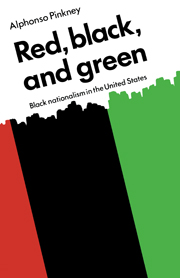Book contents
- Frontmatter
- Contents
- Preface
- 1 Introduction
- 2 The black nationalist tradition
- 3 Marcus Garvey and the Universal Negro Improvement Association
- 4 Malcolm X and the rise of contemporary nationalism
- 5 The impact of contemporary nationalism on the black community
- 6 Revolutionary nationalism: the Black Panther Party and other groups
- 7 Cultural nationalism
- 8 Religious nationalism
- 9 Educational nationalism
- 10 Black nationalism and liberation
- Epilogue
- Notes
- Index
8 - Religious nationalism
Published online by Cambridge University Press: 02 February 2010
- Frontmatter
- Contents
- Preface
- 1 Introduction
- 2 The black nationalist tradition
- 3 Marcus Garvey and the Universal Negro Improvement Association
- 4 Malcolm X and the rise of contemporary nationalism
- 5 The impact of contemporary nationalism on the black community
- 6 Revolutionary nationalism: the Black Panther Party and other groups
- 7 Cultural nationalism
- 8 Religious nationalism
- 9 Educational nationalism
- 10 Black nationalism and liberation
- Epilogue
- Notes
- Index
Summary
Throughout their long and difficult history, Afro-Americans have maintained strong religious beliefs, and the black church has always been one of the most cohesive institutions in the black community. Prior to their forced migration from Africa, few of the slaves were Christians, but upon their arrival in North America, they were denied the right to practice what the slaveholders considered their “heathen” native religions. Christianity had made inroads into black Africa, but it had succeeded in converting few Africans, because the Africans soon realized that when the Europeans arrived with their Bibles, this was merely a gimmick to steal their land. Furthermore, although Christianity taught the brotherhood of man, Christian missionaries practiced racial superiority.
The first Africans to arrive in North America were initially denied the right to participate in white Christian religious observances, for it was difficult for religious leaders to reconcile their Christianity with the brutality of the institution of slavery. However, at the beginning of the eighteenth century Christian leaders resolved this dilemma by declaring that slaves were not persons in the same sense as whites, and therefore slavery was compatible with Christianity. Thereafter Christianity was to play a crucial role in the enslavement of black people; it provided a religious rationale for slavery. There was no contradiction in being a “good” Christian and owning slaves. Indeed, many slaveholders were themselves ministers. These ministers and those who were not slaveholders taught that it was “God's will” that blacks should be slaves, and they supported their views with quotes from the Bible.
- Type
- Chapter
- Information
- Red Black and GreenBlack Nationalism in the United States, pp. 151 - 176Publisher: Cambridge University PressPrint publication year: 1976



